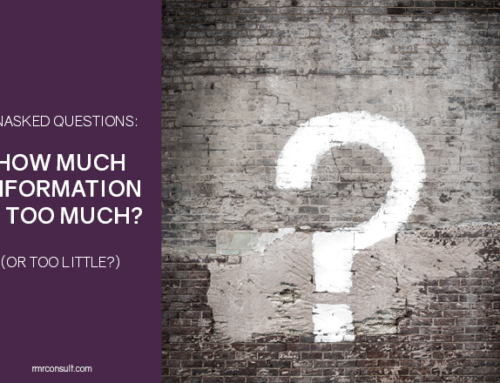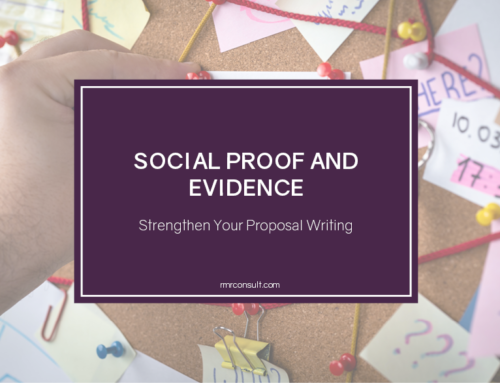Words for Proposal Writing: Choosing The Right Tone and Messaging
The basis for any quality proposal narrows down to the right language use. You could find yourself writing a proposal for the federal government, nonprofit organizations, tech companies, or business firms, and will need to choose whether formal or informal language will play a part. Identifying your audience will lead you to choose which style of writing is most suitable. For example, federal/government proposals commonly require highly technical, professional writing with a formal tone while a private or tech company may prefer a more relaxed tone. In this article, we’ll focus on your word choice and how it supports your messaging, beginning with finding specific words and phrases you can cut in order to make your proposal more powerful and engaging.
Why is it important to choose the right words for proposal writing?
1. Space
When it comes to proposal writing, we are constrained on space and are often given page limits. However, even if we aren’t restricted on the number of pages we have available, it is still important to be concise with our content and not waste the reviewer’s time.
2. Words Matter
The words we choose for proposal writing and the way we use them come together to construct a specific message. Unnecessary words might inadvertently signal that we aren’t editing, or don’t care about wasting the clients’ time (and we don’t want that now do we?) Some words can carry connotations we might not be aware of; it is important to choose the right ones so we don’t have to worry that someone might misinterpret our message.
3. Avoid Pressing Pause
This- is something that- we do not want- people to do: pause. We do not want people to be reading our proposal and then suddenly stop because a word is misused or out of context. This is why choosing the correct words for proposal writing is crucial. If someone is having a difficult time comprehending or pondering why a certain word was used, then it could lead to unneeded confusion or a negative view of the firm. Our goal with choosing our words carefully is to not give the client a reason to put the proposal down.
4. Tone
Whenever you write a proposal you are always telling a story. Your proposal writing will incorporate specific diction that is deemed most appropriate for your client, and you will have a choice to use informal or formal writing when you are writing the proposal. Think about who you are writing for, the client, the brand, and the project. For example, you could be expected to maintain a more professional and formal tone when writing a proposal for the federal/government, but, if you happen to be on closer terms with a private company, it can be appropriate to appear more personable and casual with your words.
Informal Words
Some clients require more or less formal proposals than others. If you have a strong relationship with a client and know they respond better to slightly less formal and systematic language, you can get away with a more casual tone of voice. That said, we don’t want to get too informal.
Examples of informal vs. formal words for proposal writing:
| Informal | Formal |
|---|---|
| the guys / the crew | our team, the staff |
| done | complete |
| get it | understand, procure (depending on use) |
| also | in addition |
| good | useful, positive |
| bad | negative, poor (see negative words below) |
| thing | goal, step, action |
| a bit | remove (unnecessary filler) |
| believe / feel (i.e. we feel we are) | Remove (of course you believe what you’re writing in your proposal) |
Feel like you’re talking too technical or afraid of using annoying business jargon in your proposals? Check out Marketing Speak: Toss Your Annoying Business Jargon
Unnecessary Qualifiers
These are words that aren’t necessarily needed in the sentence. They just put an emphasis on the word being used and take up more space in the proposal. Qualifiers increase or decrease the quality signified by the word it modifies.
“Often we use qualifiers that really aren’t necessary to express our meaning (such as “really” in this sentence). By deleting unnecessary qualifiers, you can often eliminate one or two words per sentence.” Writing Concisely
Remember, it is better to have everything written in a clear and concise manner – you don’t need to babble on and on about how you have a huge portfolio of really, extremely similar projects. You don’t have the time or space to ‘fluff’ your words in proposal writing; if you tell the reviewer you have an extensive portfolio, then show them that portfolio instead of saying it again.
Common qualifiers include: actually, really, basically, probably, very, definitely, somewhat, kind of, extremely, practically.
Transition Words
Of course, we all have fallen victim to unnecessary transition words (see what I did there?) Sometimes they do have their place, so we don’t have to completely undermine their use. But often, when you decide to place the word ‘in addition’ at the beginning of a sentence in your proposal, it serves no purpose and takes up space. If you need to conserve the amount of space, this is one place where you can trim your writing if needed. Unnecessary words ‘fill’ a page, but they dilute the message. We need compact, powerful, confident messaging in our proposals.
Examples of transition words:
‘in order to’ → to
‘so’
‘in addition’
‘also’
‘moreover’
‘furthermore’
Redundancies
These are pairs of words that have the same meaning, so it is not necessary to use both in the same sentence. It is as if you placed identical words right next to each other in a sentence, how does that look and sound? Doesn’t make sense, right?
“We use two or more words together that mean the same thing, or also say something is redundant when a modifier’s meaning is contained in the word it modifies, for example, ‘merge together’. Writers Write
If you want to have an impactful message, it is not necessary to take up space by using the same word twice in a row. Save yourself and your client time and just get straight to the point. At times, if you use redundancies, you may inadvertently not sound confident in your abilities. You don’t want to feel like you need to really explain or emphasize just to get your point across. Using powerful and confident language will help you to emphasize your win themes.
Examples of redundancy words:
past history → history
past experience → experience
final outcome → outcome, result
end result → result, outcome
important essentials → essentials
collaborated together → collaborated
summarize’ briefly → summarize
the reason why → reason
Say ‘No’ to Negative Words
Imagine skimming through a proposal as a reviewer and seeing ‘the schedule presents a problem.’ How would you feel when you read that? Using negative words can create a barrier or mental block amongst your client and you don’t want to create any problems for them. Your proposal should solve problems for your client and if you find yourself using negative words, it could signal to the client that they have problems they either didn’t know they have or don’t perceive as problems. Instead, you can replace the word ‘issue’ with ‘challenges’. For example, it’s easy to say that ‘the steep slope of the site presents a problem for the building design.’ But we should replace it with: ‘the steep slope presents a challenge for the building design, which may benefit from…’ This option sounds stronger because it sets us up to add the opportunity to overcome the challenge: problem presented, problem solved.
Swap negative words for positive options:
| Negative | Positive |
|---|---|
| issues / problems | challenges |
| want | prefer |
| overwhelmed | in demand |
| boring | consistent, reliable, stable |
| criticism | advice, guidance |

Audrey Gutgsell | Marketing & Communications Intern
Audrey is a rising fourth-year student in the Moody College at the University of Texas at Austin pursuing a Bachelor’s in Public Relations. She is always open and ready to learn more when it comes to enhancing her skills in both communication and writing. She is a passionate advocate for diversity, equity, and inclusion. Would describe herself as intuitive, positive, and goal-oriented. She is looking forward to starting a career in PR and cultivating meaningful relationships with clients, media, influencers, and community partners.






Leave A Comment